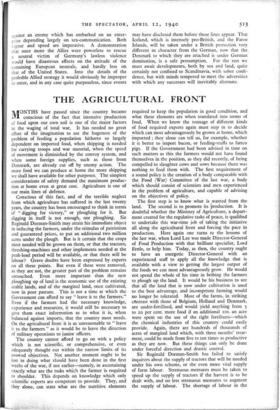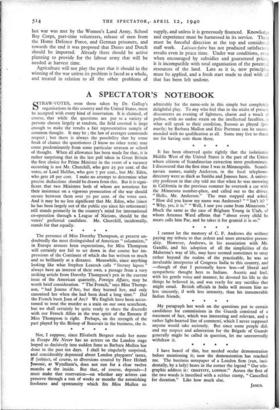THE AGRICULTURAL FRONT
MONTHS have passed since the country became conscious of the fact that intensive production of food upon our own soil is one of the major factors in the waging of total war. It has needed no great effort of the imagination to see the hugeness of the problem of feeding a population hitherto so largely dependent on imported food, when shipping is needed for carrying troops and war material, when the speed of movement is diminished by the convoy system, and when some foreign supplies, such as those from Denmark, are already cut off by enemy action. The more food we can produce at home the more shipping we shall have available for other purposes. The simplest considerations of safety demand the maximum produc- tion at home even at great cost. Agriculture is one of our main lines of defence.
Conscious of this fact, and of the terrible neglect from which agriculture has suffered in the last twenty years, the country has been encouraged to think in terms of "digging for victory," or ploughing for it. But digging in itself is not enough, nor ploughing. Sir Reginald Dorman-Smith may attain his immediate object in inducing the farmers, under the stimulus of patriotism and guaranteed prices, to put an additional two million acres under the plough. But is it certain that the crops most needed will be grown on them, or that the tractors, threshing-machines and other implements needed at the peak-load period will be available, or that there will be labour? Grave doubts have been expressed by experts on all these points. But even if these were removed, as they are not, the greater part of the problem remains untouched. Even more important than the new ploughing up of land is the economic use of the existing arable lands, and of the marginal land, once cultivated, now in poor pasture. This is not a time at which the Government can afford to say "leave it to the farmers." Even if the farmers had the necessary knowledge, experience and resources, it would still be necessary to give them exact information as to what it is, when balanced against imports, that the country most needs. On the agricultural front it is as unreasonable to "leave it to the farmers" as it would be to leave the direction of military operations to junior officers.
The country cannot afford to go on with a policy which is not scientific, or comprehensive, or even adequately thought out within the narrow limits of its avowed objectives. Not another moment ought to be lost in doing what should have been done in the first weeks of the war, if not earlier—namely, in ascertaining exactly what are the tasks which the farmer is required to shoulder. This depends on knowledge which only scientific experts are competent to provide. They, and they alone, can state what are the nutritive elements required to keep the population in good condition, and what these elements are when translated into terms of food. When we know the tonnage of different kinds of food required experts again must step in to decide which can most advantageously be grown at home, which imported ; they alone can tell us, for example, whether it is better to import bacon, or feeding-stuffs to fatten pigs. If the Government had been advised in time on such matters as this the farmers would not have found themselves in the position, as they did recently, of being compelled to slaughter cows and sows because there was nothing to feed them with. The first requirement of a sound policy is the creation of a body comparable with the Food (War) Committee of the last war, a body which should consist of scientists and men experienced in the problem of agriculture, and capable of advising on the objectives of policy.
The first step is to know what is wanted from the land. The second is to promote its Production. It is doubtful whether the Ministry of Agriculture, a depart- ment created for the regulative tasks of peace, is qualified to undertake this war-time job of taking the initiative all along the agricultural front and forcing the pace in production. Here again one turns to the lessons of the last war, when Lord Lee was made Director-General of Food Production with that brilliant specialist, Lord Ernie, to help him. Today, as then, the country ought to have an energetic Director-General with an experienced staff to apply all the knowledge that is available with a view to getting the largest output of the foods we can most advantageously grow. He would not spend the whole of his time in bribing the farmers to plough up the land. It would be his business to see that all the land that is now under cultivation is used to the best advantage, and incompetent farming would no longer be tolerated. Most of the farms, in striking Ontrast with those of Belgium, Holland and Denmark, are under-fertilised, and would yield anything from 5 to 20 per cent. more food if an additional los. an acre were spent on the use of the right fertilisers—which the chemical industries of this country could easily provide. Again, there are hundreds of thousands of acres of marginal land which, with three months' treat- ment, could be made from five to ten times as productive as they are now. But these things can only be done under forceful direction and drastic control.
Sir Reginald Dorman-Smith has failed to satisfy inquirers about the supply of tractors that will be needed under his own scheme, or the even more vital supply of farm labour. Strenuous measures must be taken to speed up the supply of tractors if the harvest is to be dealt with, and no less strenuous measures to augment the supply of labour. The shortage of labour in the last war was met by the Women's Land Army, School Boy Corps, part-time volunteers, release of men from the Home Defence Force, and German prisoners, and towards the end it was proposed that Danes and Dutch should be imported. Already there should be active planning to provide for the labour army that will be needed at harvest time.
Agriculture will not play the part that it should in the winning of the war unless its problem is faced as a whole, and treated in relation to all the other problems of supply, and unless it is generously financed. Knowleck2 and experience must be harnessed in its service. The: e must be forceful direction at the top and consider staff work. Laissez-faire has not produced satisfacte7 results even in peace time. Under war conditions, evLn when encouraged by subsidies and guaranteed prick s. it is incompatible with total organisation of the potent ii resources of the land. Late as it is, new principl_s must be applied, and a fresh start made to deal with all that has been left undone.



































 Previous page
Previous page